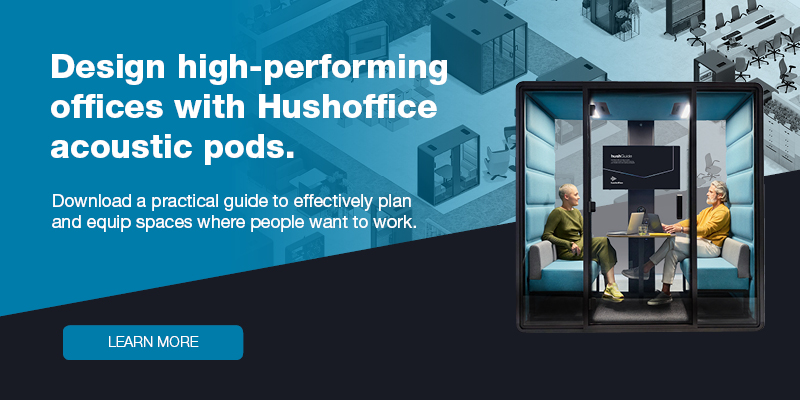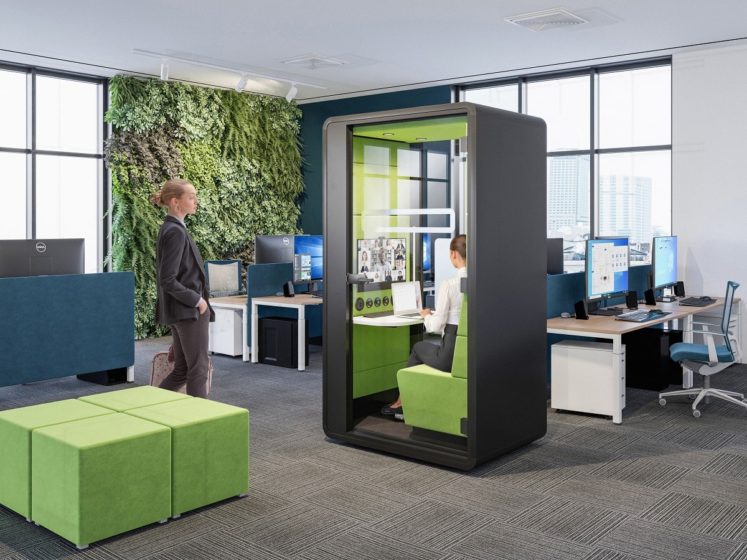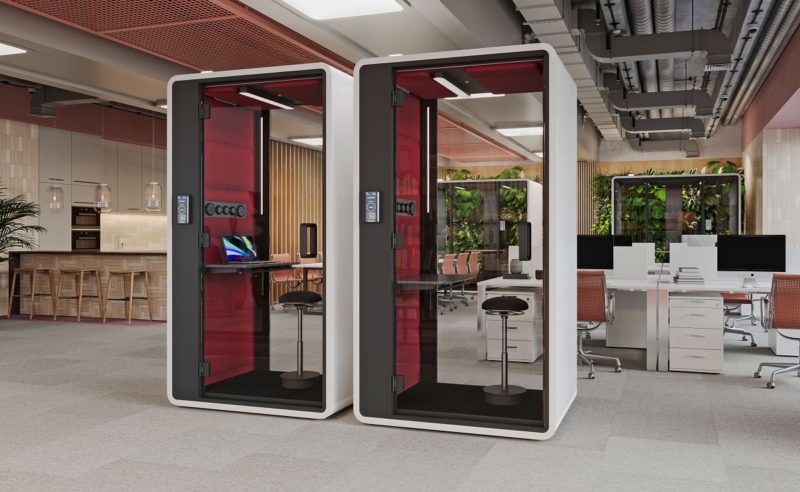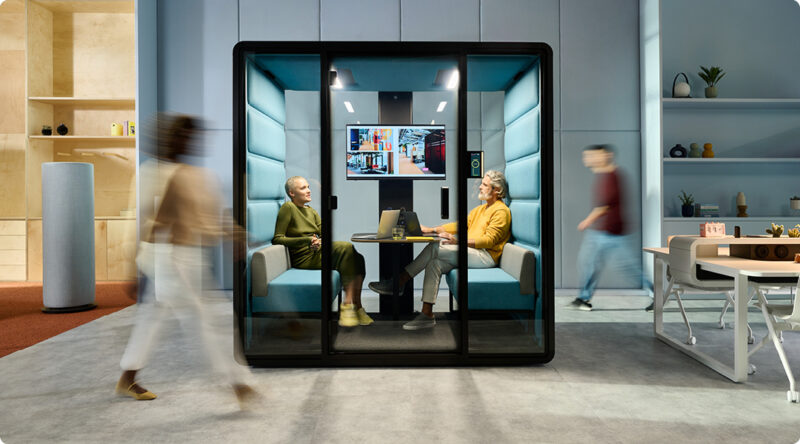An introvert’s retreat from office hubbub: acoustic pods
- Posted on: 4 April 2024
- By: Hushoffice Team
Introverts tend to be quiet heroes of the organisation, moving it forward, but rather from the backstage. The question arises: how can the office design cater for the needs of this detail-oriented, diligent employee group? Privacy is the key.
Introverts in the workplace – tl;dr
Based on estimations, introverts constitute around 50% of the workforce. ThIs group is characterised by the avoidance of sensory stimuli and a preference towards a more peaceful working environment. As they can get easily overstimulated, they flourish in minimal, low-activity workspaces when given an opportunity to enjoy some alone time. Therefore, private, self-contained workspaces are essential to foster productivity and well-being for introverted individuals.
A recent study revealed that an open-benching arrangement fosters focus and overall satisfaction among extroverted employees, whereas it tends to have the opposite effect on introverts, impeding their concentration and happiness. It is one of the first comprehensive studies that clearly demonstrate how employee preferences vary depending on their personality type. A key takeaway for employers is that the office should be zoned not only to offer dedicated spaces for specific activities, but also to provide optimal working environments adapted to a variety of employee preferences.
Acoustic pods and booths can be a game changer for introverted employees, ensuring speech privacy and peaceful, focus-conducive atmosphere. They are self-contained, pleasantly quiet spaces, providing workers with a comfortable amount of personal space. Designed with user comfort in mind, they offer a sense of autonomy and control over the immediate working environment.
Different employee types mean different expectations towards the workspace.
While extraversion is represented by outward characteristics, such as sociability, energy, or talkativeness, introversion is manifested in a more subtle way, mostly by reflective, reserved behaviour. These two types constitute two ends of the personality scale with all employees situated somewhere in between. And both introverts and extroverts require a totally different approach in office accommodation and arrangement.

Introverted individuals have their unique preferences, work routines, and approaches.
In general, solitary tasks, such as doing research or writing, suit them best as they are predominantly independent workers. Due to their propensity to get overstimulated, they prefer to work on their tasks in more secluded working environments. Additionally, if their fundamental need for alone time is not addressed properly by providing them with silent retreat areas, they can quickly run out of steam and lower their performance.
The working environment has an impact on all personality types, but in a different way.
When it comes to introverts, their energy levels grow in reflection, but decrease in interaction. Therefore, they require the presence of remote, refreshing areas in the workplace. Spaces such as private pods or booths are spot on, ensuring a quiet getaway from the office hustle and bustle, where introverts may recharge their battery whenever it gets low.

To unlock their full potential, introverted employees need dedicated spaces within the office.
While extroverted employees accomplish tasks in no time and frequently multitask, introverted individuals prefer to work at their own pace and prioritise single focus, making them thoughtful, detail-oriented workers. Adhering to their personal working rhythm allows them to ignite their spark of genius. Nevertheless, it is essential to provide them with private spaces ensuring full focus, undisturbed by colleagues or supervisors who may judge their seemingly slower, yet frequently more in-depth approach
– says Mateusz Barczyk, Senior Brand Manager, Hushoffice
A 2023 study revealed that benching can enhance concentration and overall well-being for highly extroverted workers. However, it tends to have the opposite effect on introverts, impeding their concentration and happiness. Therefore, the office needs to offer various types of workspaces meeting the diverse needs of different personality types.
The way introverted individuals process stimuli is entirely different from how extroverts do.
Hermits absorb and react to sensory stimuli in a number of different ways compared to social butterflies. In fact, there is scientific evidence behind these individual differences and understanding their impact on office design can change the rules of the game!
Neurobiology. The brains of introverts and extroverts are different both in terms of their structure and function. For instance, the brain of the introvert demonstrates higher activity in the areas connected with internal processing such as the prefrontal cortex responsible for decision making and self-reflection. On the other hand, the extroverted brain tends to be more active in the regions related to external processing and reward, such as the amygdala and nucleus accumbens, which manage social and sensory data. This explains why introverts’ need personal space and alone time in the office.
Neurotransmitter levels. Differences in neurotransmitter levels e.g. dopamine and acetylcholine have a considerable impact on the way different personality types respond to stimuli. Introverted individuals are more sensitive to dopamine – connected with reward and pleasure, which makes them less likely to seek additional stimulation as opposed to less dopamine-sensitive extroverts. For this reason the workspace should provide a strategic mix of social and solitary areas.
Arousal baselines. In general, introverted individuals are characterised by an increased baseline level of arousal compared to extroverts. As they get overstimulated by input more easily, introverts have a preference towards more peaceful environments. When it comes to extroverts, their baseline level of arousal is lower, so to reach its optimum they require more stimulating environments. That’s why the key is variety.
Information processing. Introverted individuals tend to process information deeply prior to responding to it, so it frequently takes them longer to react in social situations. Extroverts, however, are more likely to process input externally by using social interaction to influence their thinking and decision making. Therefore, the office needs to provide diverse meeting spaces to accommodate the needs of both personality types.
Attentional focus. In general, introverted individuals are characterised by a more focused attentional style and preference to deal with one task at a time as opposed to extroverts with their broader attentional focus, allowing them to multitask and manage multiple stimuli at the same time. This is the reason for extroverts’ appreciation of open-benching setups.

Open-plan offices pose considerable (yet solvable) challenges for introverted employees.
Introverted individuals demonstrate high sensitivity and awareness of their surroundings, acting like sponges that soak up all the stimuli from their immediate environment. On the other hand, extroverts are naturally able to navigate the office hustle and bustle unbothered by the commotion, feeling in their element within a dynamic, noisy workspace. Yet, lively workspaces can overwhelm introverts, overburdening them with too much cognitive input. That’s why introverted employees both need and benefit from time to introspect after completing a task or participating in a meeting. Such alone time allows them to collect their thoughts, clear their mind, and regain balance needed to move on to the next assignment. A minimalistically-designed space such as a hushFree booth makes a perfect relaxation zone, cancelling out unnecessary stimuli and ensuring an effective sensory reset
– explains Mateusz Barczyk, Senior Brand Manager, Hushoffice.
Indeed, introverted employees need regular isolation in a calm, uncluttered space to thrive. Compared to extroverts, they require a greater sense of control to feel comfortable in their workspace and be able to fully concentrate on their task at hand. For them, privacy, peacefulness, and autonomy are the essential aspects of workspace design.
For “shy” workers the presence of acoustic cubicles within the open office is a lifesaver.
A pod is an ideal low-key environment for overstimulated employees who need to regain balance. Additionally, pods such as hushFree.S offer the desired element of adjustability through customisable lights and ventilation, providing control-seeking introverts with necessary autonomy.
Peace and quiet nourish the loner employee’s nature.
The truth is that for inward-facing employees, temporary resets in a peaceful environment are not a nice-to-have, but a must-have – a freedom allowing stimuli sensitive individuals to think, feel, and perform at their best.

Low-stimulus environments can work wonders for all employees regardless of their disposition.
In fact, nobody is 100% extroverted or introverted all of the time. And different tasks require different approaches and conditions. While your most professional sales representative may enjoy the team spirit fostered by open benching, they may simultaneously need the comfort and privacy of a phone booth, such as hushFree.S, to effectively manage client calls.
Peaceful and private, pods and booths can be a missing piece in the inclusive design puzzle.
Regardless of disposition, everyone requires privacy to accomplish tasks. Private work booths make an excellent design solution, providing employees with the necessary degree of privacy without disrupting the lively dynamics of an open-office environment. In essence, they help strike a balance between social and private office spaces.
Acoustic pods and booths serve as quiet sanctuaries, ensuring psychological comfort.
Since introverts are often thoughtful, they need time to reflect before voicing their thoughts. Encouraging them to open up is about creating a physically and emotionally safe space that maximises their comfort. Hushed, cosy, acoustic, and private meeting cabins, such as hushFree.M, offer a top-notch solution by providing unparalleled physical comfort to their users.

Acoustic booths enhance stress management by offering employees a private escape from the office hubbub.
Regular breaks improve overall well-being by minimising fatigue and ensuring effective mental recovery, which helps keep burnout at bay. In fact, prioritising them boosts resilience and simply makes you happier. HushFree.L offers an ideal space for relaxation: silent and cosy, with dimmable lighting and lounge chairs, it turns your break time into a tranquil getaway from the office busyness.
Meet the needs of both introverts and extroverts simultaneously by investing in hushFree booths.
While introverted individuals require some alone time in a safe haven, extroverts need opportunities to connect with their colleagues in collaborative areas. HushFree booths address both needs, providing a calm, private space for introspection as well as a soundproof space for lively group discussions, based on the current needs of your employees.
Is there any unquestionable aspect of effective office design? Yes! Without a shadow of a doubt, it’s variety. Offering employees an array of work settings to choose from allows them to work most intuitively and enjoy the individual freedom, seamlessly transitioning from collaborative areas to private pods to shift focus. And when we refer to variety, we mean variety from a sensory perspective. For instance, one office area may feature casual bar-height tables, illuminated by steady southern sunlight while another provides a more secluded atmosphere in a shady spot under a stairwell, furnished with lounge seating and minimal lighting. Each space offers its own, specific sensory experience ranging from the bustling social energy in a work cafe to the peaceful ambience of the hushFree.M 4-person team meeting booth with its top-notch, acoustically-designed interior. Sense by sense, each office space may be diversified to provide employees with a wide selection of workspace choices. And private pods and booths, addressing the need for confidential, focused workspaces, are an essential component of this design strategy
– says Mateusz Barczyk, Senior Brand Manager, Hushoffice.

Click here to find out more about our hushFree collection of Class A acoustic work and team meeting booths.
Introverts in the workplace – summarized
Based on estimations, introverts constitute around 50% of the workforce. ThIs group is characterised by the avoidance of sensory stimuli and a preference towards a more peaceful working environment. As they can get easily overstimulated, they flourish in minimal, low-activity workspaces when given an opportunity to enjoy some alone time. Therefore, private, self-contained workspaces are essential to foster productivity and well-being for introverted individuals.
A recent study revealed that an open-benching arrangement fosters focus and overall satisfaction among extroverted employees, whereas it tends to have the opposite effect on introverts, impeding their concentration and happiness. It is one of the first comprehensive studies that clearly demonstrate how employee preferences vary depending on their personality type. A key takeaway for employers is that the office should be zoned not only to offer dedicated spaces for specific activities, but also to provide optimal working environments adapted to a variety of employee preferences.
Acoustic pods and booths can be a game changer for introverted employees, ensuring speech privacy and peaceful, focus-conducive atmosphere. They are self-contained, pleasantly quiet spaces, providing workers with a comfortable amount of personal space. Designed with user comfort in mind, they offer a sense of autonomy and control over the immediate working environment.
Hushoffice – Frequently Asked Questions
Why should introversion be taken into account while designing the office space?
In general, addressing personality diversity is an important step in creating an inclusive and supportive working environment for every employee. Recognising and meeting the needs of introverted individuals is essential. Providing adequate spaces for noise-free, autonomous work can align with their appreciation of privacy and personal space. Additionally, investing in sound insulation and creating designated tech-free areas can help prevent sensory overload, enhancing their productivity and overall well-being.
What can be done to make the office more introvert-friendly?
There are several solutions that will support introverts in their workplace and enhance their performance, including tech-free zones, meeting-free days, and quiet workspaces.
What changes to the workspace can I introduce to support introverted individuals?
The number-one request from many introverted individuals is for more privacy. This need can be addressed by introducing desk dividers, acoustic baffles, or desktop privacy screens. Another effective solution could be investing in self-contained work booths, such as hushFree.S.







